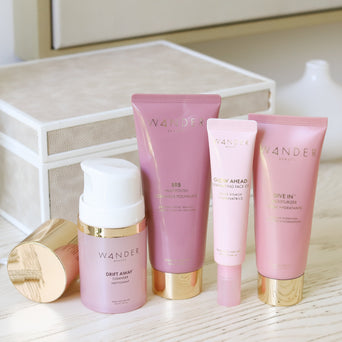Are Acids Weakening Your Skin's Barrier? Everything You Need To Know
By Emily Chiang | Aug 30, 2019
Many of us may find the thought of using acids on our face daunting while the rest of us are chemical exfoliation addicts. While using acids sounds intimidating, rest assured, there is a way you can use skincare acids to target your beauty concerns while maintaining your skin’s barrier.
What is The Skin Barrier and What Does It Do?
Your skin is your body’s largest organ: It guards your body against extreme temperatures and harmful environmental factors. Your skin barrier is the outermost layer of your skin and it is responsible for maintaining your skin’s hydration and firmness. It acts as a protective barrier from bacteria and environmental irritants that might try to penetrate the skin. Climate change, over-exfoliation and harsh ingredients in your beauty products are some of the ways your skin barrier can become compromised.
What is the Acid Mantle?
Have you heard of the acid mantle? Not many people have. Your acid mantle is actually located on the surface of your skin. It is a fine, slightly acidic film that acts as a barrier to harmful microbes and other irritants that might penetrate the skin. The acid mantle is the protective film of natural oils, amino acids and sweat that covers your skin. Over exfoliating or using products with harmful ingredients will damage your acid mantle which can result in inflammation and breakouts.
How Do I Know If My Skin Barrier/Acid Mantle is Damaged?
If you have ever noticed that your skin is flaky, inflamed, suddenly sprouts acne, rashes or dry skin appears out of nowhere, you might have a compromised skin barrier. There are many possible culprits, so it’s difficult to narrow it down to one single cause, but common possibilities include: over-exfoliating, using products with harsh ingredients, and extreme weather conditions (like cold or wind).
Years of using products that are badly formulated are, more often than not, the culprit behind a weakened skin barrier. It is important to be aware of what is in your beauty products!
A common misconception is when people mistaken their weakened skincare barrier with sensitive skin. It’s actually more likely that years of using products that are bad for your skin caused the issues your skin is dealing with.
Acids and Their Benefits
There are many misconceptions about using acids in skincare. We’re here to remind you that while acids sound harsh, there is nothing to fear if you use the proper acid for your skin type in the proper way.
Acids provide many benefits. They can be anti-aging miracle workers as well as moisture magnets. However, all acids should be used with caution because too much of anything is never a good thing. You may think that removing all of the dead skin cells you can is the solution to achieving smoother and brighter skin. However, dead cells actually serve a purpose! They protect your newer skin cells that are not ready to come to the surface yet. If you remove too many layers of skin, you’ll only be left with red and irritated skin. It is important to exfoliate skin, but never daily. Your skin will thank you in the long run!
Some of the most popular types of acids that are found in skincare products are AHAs and BHAs. They are found in chemical exfoliants which are different from physical exfoliators. If you use a chemical exfoliator, it should be used no more than once a week for dry or sensitive skin and up to three times a week for oily skin.
For a more in depth explanation about what AHAs and BHAs are, read this post.
Depending on your skin type, there are different acids that will be more beneficial for your skin. Here are some examples:
Dry Skin: glycolic acid
Oily and Acne-Prone Skin: salicylic acid
Sensitive Skin: lactic acid, PHAs
Can I Layer Acids?
Layering skincare and layering acids is possible, but you should proceed with caution. There are a lot of misconceptions about what kind of acids you can mix with one another. One concern that we find many people are worried about is layering AHAs with vitamin C and retinoids. If you have sensitive skin, layering AHAs, vitamin C and retinoids is pretty much asking for irritated skin. Even if your skin isn’t sensitive, it is best to start slow and introduce these acids into your skincare routine. More is not always more.
We recommend that you use vitamin c in the morning under your sunscreen and AHAs or retinoids during the night time to give skin time between products.
Another way to make it easier for yourself is to look for products that contain multiple acids! Beauty products that have been formulated to achieve the most benefits with the least amount of side effects for your skin are a quick and easy way to improve skin’s appearance without all the damage.
When in doubt, use different acids at different times of the day or week.
How to Restore Your Skin Barrier
If you find yourself battling a compromised skin barrier and fighting rashes or irritation left and right, please visit your dermatologist! They can help you find out what the underlying problem is and how to treat it. First and foremost, in order to maintain a healthy skin barrier, refrain from overusing acids and scrubs. Instead, reach for face oils and soothing ingredients that will help to hydrate, strength and heal your complexion.
Do you have questions about the skin barrier? DM us @Wander_Beauty!
Are Acids Weakening Your Skin's Barrier? Everything You Need To Know

Many of us may find the thought of using acids on our face daunting while the rest of us are chemical exfoliation addicts. While using acids sounds intimidating, rest assured, there is a way you can use skincare acids to target your beauty concerns while maintaining your skin’s barrier.
What is The Skin Barrier and What Does It Do?
Your skin is your body’s largest organ: It guards your body against extreme temperatures and harmful environmental factors. Your skin barrier is the outermost layer of your skin and it is responsible for maintaining your skin’s hydration and firmness. It acts as a protective barrier from bacteria and environmental irritants that might try to penetrate the skin. Climate change, over-exfoliation and harsh ingredients in your beauty products are some of the ways your skin barrier can become compromised.
What is the Acid Mantle?
Have you heard of the acid mantle? Not many people have. Your acid mantle is actually located on the surface of your skin. It is a fine, slightly acidic film that acts as a barrier to harmful microbes and other irritants that might penetrate the skin. The acid mantle is the protective film of natural oils, amino acids and sweat that covers your skin. Over exfoliating or using products with harmful ingredients will damage your acid mantle which can result in inflammation and breakouts.
How Do I Know If My Skin Barrier/Acid Mantle is Damaged?
If you have ever noticed that your skin is flaky, inflamed, suddenly sprouts acne, rashes or dry skin appears out of nowhere, you might have a compromised skin barrier. There are many possible culprits, so it’s difficult to narrow it down to one single cause, but common possibilities include: over-exfoliating, using products with harsh ingredients, and extreme weather conditions (like cold or wind).
Years of using products that are badly formulated are, more often than not, the culprit behind a weakened skin barrier. It is important to be aware of what is in your beauty products!
A common misconception is when people mistaken their weakened skincare barrier with sensitive skin. It’s actually more likely that years of using products that are bad for your skin caused the issues your skin is dealing with.
Acids and Their Benefits
There are many misconceptions about using acids in skincare. We’re here to remind you that while acids sound harsh, there is nothing to fear if you use the proper acid for your skin type in the proper way.
Acids provide many benefits. They can be anti-aging miracle workers as well as moisture magnets. However, all acids should be used with caution because too much of anything is never a good thing. You may think that removing all of the dead skin cells you can is the solution to achieving smoother and brighter skin. However, dead cells actually serve a purpose! They protect your newer skin cells that are not ready to come to the surface yet. If you remove too many layers of skin, you’ll only be left with red and irritated skin. It is important to exfoliate skin, but never daily. Your skin will thank you in the long run!
Some of the most popular types of acids that are found in skincare products are AHAs and BHAs. They are found in chemical exfoliants which are different from physical exfoliators. If you use a chemical exfoliator, it should be used no more than once a week for dry or sensitive skin and up to three times a week for oily skin.
For a more in depth explanation about what AHAs and BHAs are, read this post.
Depending on your skin type, there are different acids that will be more beneficial for your skin. Here are some examples:
Dry Skin: glycolic acid
Oily and Acne-Prone Skin: salicylic acid
Sensitive Skin: lactic acid, PHAs
Can I Layer Acids?
Layering skincare and layering acids is possible, but you should proceed with caution. There are a lot of misconceptions about what kind of acids you can mix with one another. One concern that we find many people are worried about is layering AHAs with vitamin C and retinoids. If you have sensitive skin, layering AHAs, vitamin C and retinoids is pretty much asking for irritated skin. Even if your skin isn’t sensitive, it is best to start slow and introduce these acids into your skincare routine. More is not always more.
We recommend that you use vitamin c in the morning under your sunscreen and AHAs or retinoids during the night time to give skin time between products.
Another way to make it easier for yourself is to look for products that contain multiple acids! Beauty products that have been formulated to achieve the most benefits with the least amount of side effects for your skin are a quick and easy way to improve skin’s appearance without all the damage.
When in doubt, use different acids at different times of the day or week.
How to Restore Your Skin Barrier
If you find yourself battling a compromised skin barrier and fighting rashes or irritation left and right, please visit your dermatologist! They can help you find out what the underlying problem is and how to treat it. First and foremost, in order to maintain a healthy skin barrier, refrain from overusing acids and scrubs. Instead, reach for face oils and soothing ingredients that will help to hydrate, strength and heal your complexion.
Do you have questions about the skin barrier? DM us @Wander_Beauty!


